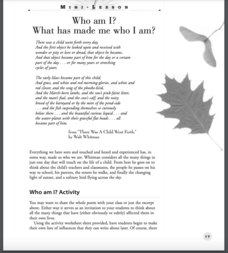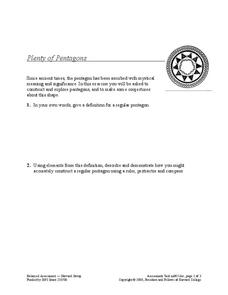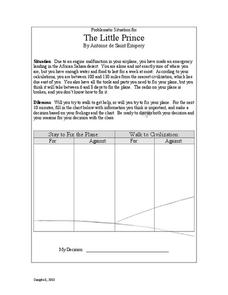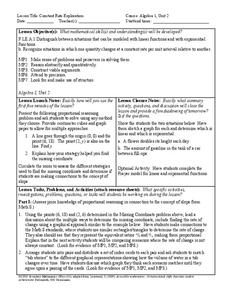Curated OER
ESL Grammar: Have to/Don't Have to
In these English Language grammar worksheets, learners complete several exercises that help them learn to write the positive or negative form of 'have to.' Students write sentences use 'have to' or 'don't have to' depending on the...
Scholastic
Who Am I? What Has Made Me Who I Am?
"Everything we have seen and touched and heard and experienced has, in some way, made us who we are." Your young learners will use this resource to create lists of influences (people, animal, nature, places, etc.) in their lives and to...
Curated OER
I Have...Who Has ... Cards - Limits
In this limits worksheet, students solve 20 limits problems. Students each have a card with a limit problem and answer. Students solve the limit problem and find the person with their answer.
Curated OER
I Have a Dream...
Students explore the dream of Martin Luther King, Jr. In this civil rights activity, students utilize their computer skill as they compose "I have a dream" statements.
Curated OER
The Odyssey Lesson 5
Review the vocabulary from The Odyssey with this fun "I Have, Who Has" game. First, give students random vocabulary cards (included) that say "I have (vocabalary word). Who has (definition of another vocabulary word)?" Students are...
PBS
An Attack on Syria- What Would You Do?
Has United States military intervention in the conflicts of other countries always been warranted? After reviewing a brief background on contemporary US conflicts and reading articles describing the civil war in Syria, your learners...
Computer Science Unplugged
Treasure Hunt—Finite-State Automata
Introduce your class to the concept of finite-state automata with an activity that asks individuals to try to map their way to Treasure Island by taking different routes though an island chain. Each island has two ship sailing...
Chicago Botanic Garden
Greenhouse Gas Emissions – Natural and Human Causes
Part three in the series of seven has pupils discussing the different greenhouses gases, learning about the carbon cycle, and then watching a short video about the carbon cycle. Based on their knowledge, individuals complete a greenhouse...
BBC
Getting Online One Click at a Time
The Internet is a vast and fascinating place to be, but you have to know how to get there first! Use a helpful guide to become computer savvy in no time. It covers computer basics such as keyboarding and hardware, and goes into e-mail,...
Teach Engineering
Are We Alone?
Find an answer to the age-old debate of whether life exists on Mars. Groups determine criteria to help look for signs of life on Mars. The activity has the class simulate testing Martian soil samples for signs of life before drawing...
University of Oklahoma
Developing My Resources
Learners with special needs create Summary of Performance (SOP), a written document which describes their disability, its impact on their daily life, ways they have learned to compensate, their personal strengths, and their goals. The...
Roald Dahl
Matilda - Miss Trunchbull
How would you react to the Trunchbull if she was your teacher? This is the focus of an activity that has readers imagining and then acting out their reactions to various Trunchball scenarios in the story.
Balanced Assessment
Plenty of Pentagons
Why are only four colors needed to color webs from regular pentagons, not five? An assessment task requires young mathematicians to first construct regular pentagons using a compass and straightedge, then has them consider a shape...
K20 Learn
Bavaria Has Issues...Experimental Components
Do you want to be a detective by analyzing situations? An engaging lesson provides young historians with the tools to help them understand the difference between data types and how to analyze them to draw conclusions. Scholars complete...
Curated OER
The Little Prince: Problematic Situation
Your plane has crashed in the Sahara desert. What do you do? Explore the possibilities with a role-playing activity based on Antoine de Saint Éxupery's The Little Prince. In groups, kids decide whether they would walk to find help...
Novelinks
Words By Heart: K-W-H-L Strategy
How can we heal our hearts through forgiveness? The third activity in a series of six prompts readers to answer questions about Words by Heart by Ouida Sebestyen. Not only does it activate background knowledge on the...
San Francisco Public Utilities Commission
Let's Save Water: Water Conservation
Did you know that cutting down your shower by one minute a day can save five gallons of water? Learn about water conservation with a science reading activity. After kids finish reading key terms and water-saving tips in a reading...
Overcoming Obstacles
Getting Along
Wouldn't it be nice if we could all learn to get along? Middle schoolers review the skills they have learned in other lessons in the course and apply them to a series of activities. They then create posters illustrating their advice on...
EngageNY
Characteristics of Parallel Lines
Systems of parallel lines have no solution. Pupils work examples to discover that lines with the same slope and different y-intercepts are parallel. The 27th segment of 33 uses this discovery to develop a proof, and the class determines...
Howard County Schools
Constant Rate Exploration
Question: What do rectangles and bathtub volume have in common? Answer: Linear equations. Learn how to identify situations that have constant rates by examining two different situations, one proportional and one not proportional.
Balanced Assessment
Fermi Estimates I
Enrico Fermi, the physicist responsible for the first nuclear detonation, was known for his ability to estimate with little or no data. Use this task to have your classes practice their Fermi skills. They estimate the magnitude of three...
Curated OER
Candlemaking
There might not be a butcher or baker, but you'll have a class full of candlestick makers after a hands-on lesson about candles make from beeswax. After a brief history of where beeswax comes from, young artisans craft their own...
EngageNY
Exploiting the Connection to Cartesian Coordinates
Multiplication in polar form is nice and neat—that is not the case for coordinate representation. Multiplication by a complex number results in a dilation and a rotation in the plane. The formulas to show the dilation and rotation are...
Teaching Ideas
The Aztecs
Did you know the Aztecs had two different calendars? Or that Aztec men could have more than one wife? Find out more about this ancient civilization including how they lived, what they ate, and their cultures and beliefs with a set of 20...
Other popular searches
- 1st Grade Grammar Has/have
- Helping Verbs Have Has
- Has and Have
- I Have Who Has
- I Have Who Has Game
- Using Has and Have
- Has Have
- Have To/has To
- Verbs Has and Have
- Have Got Has Got
- Have Has Had
- Language Has and Have























